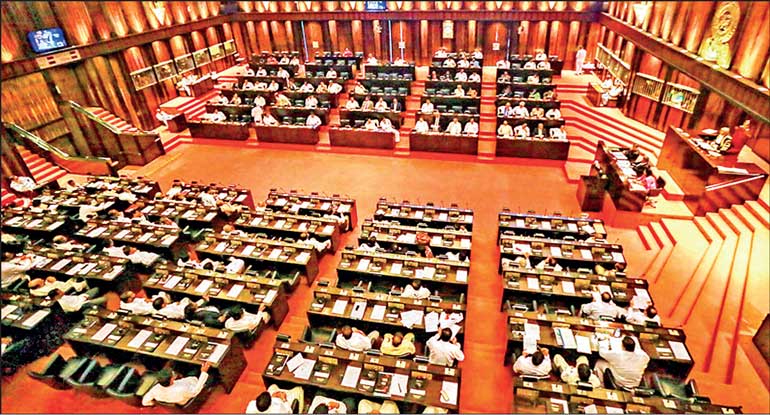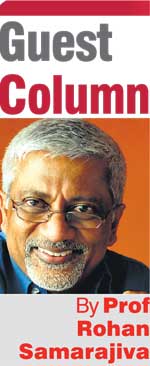Friday Feb 13, 2026
Friday Feb 13, 2026
Friday, 7 October 2022 00:00 - - {{hitsCtrl.values.hits}}

It will not be easy for SLPP MPs to vote for the 22nd Amendment that would reverse most of the provisions of the 20th Amendment that they approved just two years ago. But they must do so
 It would not have been easy for President Wickremesinghe to reverse the order he had signed to declare designated areas of Colombo as high-security zones. But he did it, probably because he concluded that the original order was wrong and would be difficult to defend in court. He did the right thing.
It would not have been easy for President Wickremesinghe to reverse the order he had signed to declare designated areas of Colombo as high-security zones. But he did it, probably because he concluded that the original order was wrong and would be difficult to defend in court. He did the right thing.
Those who voted for 20th Amendment should vote for the 22nd
It will not be easy for SLPP MPs to vote for the 22nd Amendment that would reverse most of the provisions of the 20th Amendment that they approved just two years ago. But they must do so. They must correct the mistake they made by giving unfettered power to one fallible man. If they do not, they will be held to account in the court of public opinion.
The former President, to his credit, has acknowledged several of his wrongs and reversed most of them. In his address to the nation on 11 May 2022, he promised to “enact a Constitutional Amendment that would restore the substance of the 19th Amendment.” This was a tacit admission that he did wrong by pressuring Parliament to emasculate itself by approving the 20th Amendment. It is time for Parliament to do its duty and right this wrong that led to many others.
The wrong that led to many wrongs
Below is what I wrote in September 2020, as part of our campaign against the 20th Amendment:
The overall thrust of the 20th Amendment is the concentration of power in the Presidency, a single individual, and the disempowerment of those who may pose difficult questions or bring to bear other perspectives… Many would agree that such a concentration of power would be unwise if the President in question was Mr Maithripala Sirisena, now an object of ridicule to many. But a sizeable number would say that the current President is a technocrat who appreciates the value of expertise and has the support of many professionals, such as those from Viyath Maga. This President, they would claim, has been elected to take decisive action without the distractions of Parliamentary oversight and judicial challenges.
Today, no evidence is necessary for my claim that concentration of power in the President was wrong. We are all paying the price for the resulting bad decisions. Parliament was disempowered from asking questions about the country’s ability to manage the foreign debt burden. Individual MPs had qualms about the sudden ban on chemical fertilisers, pesticides and weedicides, but were unable to raise concerns. These were direct outcomes of the 20th Amendment.
When the President’s supporters complained of Police inaction in the aftermath of the May attack on GotaGoGama, the IGP said that 182 of 184 Police Stations were headed by persons appointed not on merit but at the request of ruling-party MPs from the areas. This was a direct result of the abolition of the Police Commission by the 20th Amendment.
At least for the sake of law and order, something that is valued by all, the SLPP MPs should vote to restore the provisions for independent commissions enacted in both the 17th and 19th Amendments. To preclude a single, fallible individual from crashing the economy, they should undo the wrong they did by approving the 20th Amendment.
It is the right thing to deliver on what has been promised in Geneva, as indicated by the language in the Human Rights Council’s draft resolution:
Acknowledging the stated commitment of the Government of Sri Lanka to constitutional reforms while stressing the importance of the independence of key commissions and institutions, including the Human Rights Commission of Sri Lanka, the Election Commission, the National Police Commission, the Judicial Service Commission and the Commission to Investigate Allegations of Bribery or Corruption, and of the judiciary
Those who voted against the 20th should vote for the 22nd
Seems like a no-brainer for those who did the right thing in 2020 to do it again. But it appears that matters may not be that simple. It may be that some who opposed the 20th may choose to abstain on the new amendment. Because it is unlikely that 150 votes will be supplied by the fractured SLPP, opposition votes may be decisive.
Good Constitutional amendments have the support of multiple parties. Only Sarath Weerasekera voted against the 19th Amendment in 2015. Bad amendments such as the 18th and the 20th were rammed through with ruling-party and turncoat votes. With a splintered SLPP, that is no longer an option. The 20th Amendment can be rolled back only with support from both sides of the aisle.
The amendment that is modified to suit the Supreme Court is undoubtedly an imperfect document. Based on the reasoning in their recent decision on the SJB’s 21st Amendment, the court weakened the bill below the level of the 19th Amendment. There may be those who will not vote for it because of its imperfections or because they want the President to fail. The compromises that may be required to win enough votes from the SLPP, such as restoring the provision that the President cannot dissolve Parliament before 4.5 years or removing the proposed restrictions on dual citizens, may also be used to rationalise non-support.
But these MPs are shooting themselves in the foot. It is critically important to restore the Constitutional Council and do fresh appointments to the independent commissions. The 20th Amendment abolished the Constitutional Council and enabled the former President to appoint yes men and women to critical bodies such as the Election Commission and CIABOC. The flunkies appointed to the Elections Commission cleaned out layers of competent officers. The former President appointed a person obviously biased in favour of his family to head CIABOC. Unsurprisingly, a whole series of cases against the family and friends were withdrawn.
The cleanest general elections were held under the 19th Amendment. It would be foolhardy go for elections without restoring the independence of the Election Commission. It has been announced that new legislation to remedy shortcomings in the current legislation will be presented shortly. However, this will not yield the desired results if the questionable appointments made at the sole discretion of the previous President under the 20th Amendment are not changed. It would be a slap in the face of citizens wanting effective action on bribery and corruption to reject the opportunity to improve the process of appointing members of the CIABOC.
There may be those in the SJB and the JVP who believe they can win the next election with a majority large enough to replace the 1978 Constitution with a perfect document. This is a pipedream.
First, they have to win the election under an all-powerful President and not-independent commissions. Second, there is no guarantee that the SLPP’s achievement in 2020 can be repeated. More likely is a highly fractured parliament, with even more parties and factions than now. Rejection of the incremental changes proposed now may result in having to live with the perversities of the 20th Amendment for a long time.
Let us learn from the platitudes. The perfect is the enemy of the good. Politics is the art of the possible. The imperfect 22nd Amendment is what is possible now. After we repair the egregious damage with a good-enough amendment, we can get started on the perfect Constitution.